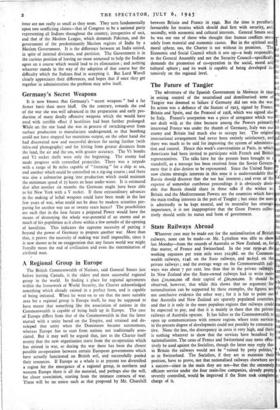State Railways Abroad
Whatever case may be made out for the nationalisation of British railways, none can be made—as Mr. Lyttelton was able to show last Monday—from the records of Australia or New Zealand, or, for that matter, of France and Switzerland. In the year 1939-40 the working expenses per train mile were 210.98d. on the Common- wealth railways, 114d. on the State railways, and 9o.65d. on the private railways ; and the average wage on the Commonwealth rail- ways was about 7 per cent, less than that in the private railways. In New Zealand also the State-owned railways had to write more than £to,000,000 off their capital of £6o,000,000. It should be observed, however, that while this shows that no argument for nationalisation can be supported by these examples, the figures are not conclusive evidence the other way ; for it is fair to point out that Australia and New Zealand are sparsely populated countries, and that it is only in the more populous regions that railways could be expected to pay, and that it is mainly in these that the private railways of Australia operate. It has fallen to the Commonwealth to open up communications with remote regions where train services in the present degree of development could not possibly be remunera- tive. None the less, the discrepancy in costs is very high, and there is nothing whatever to show that the services have benefited by nationalisation. The cases of France and Switzerland may more effec- tively be used against the Socialists, though the latter may reply that in Britain the railways would not be "ruined by petty politics," as in Switzerland. The Socialists, if they are to maintain their position, have to prove, not that nationalised railways elsewhere arc a success—since in the main they are not—but that the extremely efficient service under the four main-line companies, already pretty severely controlled, would be improved if the State took complete charge of it.




























 Previous page
Previous page